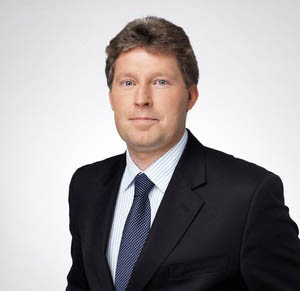"Though we have acheived progress, our work is not over. That is why I support the mission of the Arms Control Association. It is, quite simply, the most effective and important organization working in the field today."
Q&A: Ambassador Adam Bugajski: ‘The NPT is still strong and alive.’
April 2018
 Adam Bugajski, Poland’s permanent representative to the UN Office and international organizations in Vienna, is chairman of the second session of the preparatory committee for the 2020 review conference of the nuclear Nonproliferation Treaty (NPT), being held in Geneva on April 23-May 4. These responses to questions from ACT’s Alicia Sanders-Zakre have been edited for clarity.
Adam Bugajski, Poland’s permanent representative to the UN Office and international organizations in Vienna, is chairman of the second session of the preparatory committee for the 2020 review conference of the nuclear Nonproliferation Treaty (NPT), being held in Geneva on April 23-May 4. These responses to questions from ACT’s Alicia Sanders-Zakre have been edited for clarity.
As chair of the NPT preparatory committee, how will you seek to bridge the growing divides within the international community, for example on the pace of disarmament?
My role as the chairman of the second stage of the 2020 review cycle is, first and foremost, to uphold and strengthen the NPT in all of its aspects. It can be achieved by open, inclusive, mutually respectful, and transparent dialogue. I am ready to work on every reasonable and viable proposal in accordance with well-established rules. Yet, the success or failure of the 2020 review cycle is on the states-parties. It is fair to say that, at this stage, many states-parties prefer a steady pace of work and are not struggling for outcomes on the most delicate dossiers.
I am fully aware, of course, of different positions on disarmament and of difficulties to find a common ground on the basis of NPT Article VI. Under the present circumstances, one must be realistic. The second preparatory committee is a building block in the whole construction of the review cycle, which will be concluded in 2020; and until that moment, there is still plenty of space to find the way to bring us closer to the answers and solutions. One must remember that there is no single road toward disarmament and that disarmament is not only about reductions. Different countries and groups of states have different approaches, and neither of them should therefore be regarded as the only valid one. Much depends on the P5 states, as those who are in possession of nuclear weapons, but the voice of others could serve as an important prompt for constructive dialogue, free
of any prejudices and unrealistic expectations. The meeting offers a useful and well-structured platform
for such a dialogue.
And on a zone free of weapons of mass destruction (WMD) in the Middle East?
The same applies to the creation of the WMD-free zone in the Middle East. This issue regularly posed a challenge to recent review cycles. It is not going to be different this time, I suppose. My visit to the region revealed that it is still difficult to find a common ground to build on. There is a clarity on the goal, and the 1995 Resolution [on the Middle East] remains the ultimate reference for a solution, but there are currently more questions than answers on modalities and on the next step to be taken. However, with the help of other interested parties, such co-conveners, and possibly also international organizations, the region itself is able to come up with a viable proposal at least as to the general direction of their further actions.
What should be accomplished during the 2018 NPT preparatory committee in order to set the stage for a successful NPT review conference in 2020?
The NPT review cycles always have been challenging. Only half of the review conferences ended up with the positive outcome. But on the eve of its 50th anniversary, the NPT is still strong and alive. It is pretty much the most comprehensive treaty if you compare it to the other arms control treaties, and we deal with the deadliest weapon ever invented by mankind. It is true that the NPT is also fragile and easy to be undermined. Therefore, we all have the responsibility to take care of it. This is why a well-thought-through structure of the review cycles has been established for permanent improvement. I am not in a position to judge whether this cycle will be successful. Whether we will have a comprehensive progressive outcome document; a series of decisions, as was the case in 1995; or a short but bold political declaration, it is premature to predict at this stage.
What is the biggest challenge?
The biggest challenge, I believe, is the current global security situation, full of tensions and largely unpredictable. It is fair to say that those circumstances are not conducive to a successful NPT review cycle as it does not exist in the vacuum. At the same time, I believe that a passive, sort of “wait and see” approach could easily lead to the next failure. Therefore, my choice was for a positive engagement and common diplomatic effort to change the situation in the sphere of disarmament and nonproliferation. I hope it will pay back.
However, what actually can be accomplished during this preparatory committee session and beyond to build toward the 2020 review is to limit the discrepancies in areas where it is feasible, for example in the disarmament area. We can also identify and mark the issues where progress can be made on the way to 2020. Full support for institutions like the International Atomic Energy Agency and Comprehensive Test Ban Treaty Organization should be shown by all states as they are indispensable instruments of the NPT portfolio. It all can be done through fair, open discussion given an understanding that the NPT is our common value and there will not be any better instrument dealing with nuclear nonproliferation.
